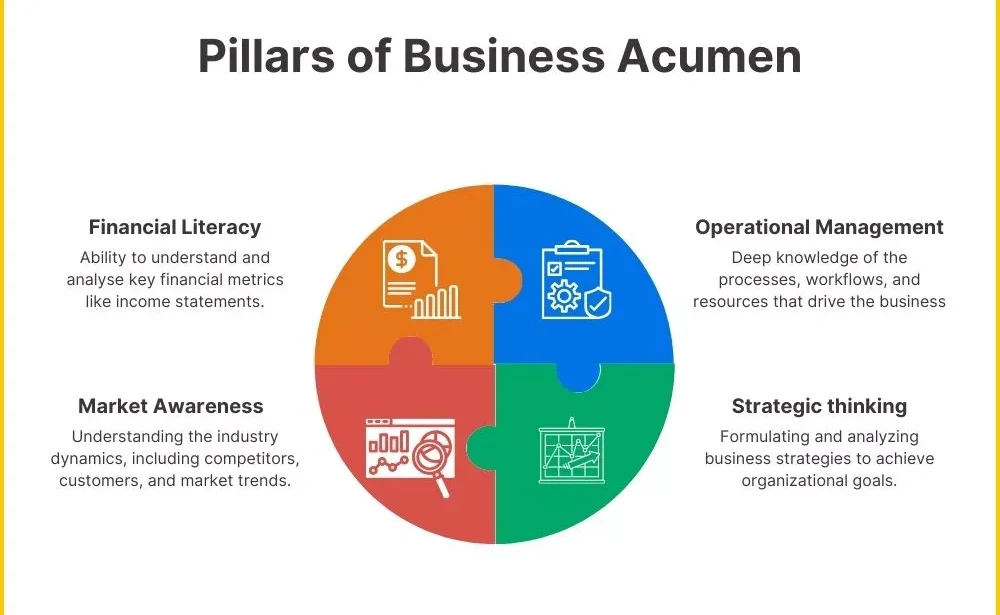In today’s fast-paced world, information overload reigns supreme. We’re bombarded with data, opinions, and stimuli from every corner. But what truly sets successful individuals apart is their ability to navigate this chaos with acumen.
Acumen, at its core, signifies sharpness of mind and judgment. It’s the ability to think critically, analyze information effectively, and make sound decisions. It’s the discerning eye that sees through the noise and identifies the essence of a situation.
This article delves into the multifaceted world of acumen, exploring its various dimensions and how you can cultivate this valuable skill. We’ll unpack the different types of acumen, explore its benefits, and equip you with practical strategies to sharpen your mind and make informed decisions.
The Many Facets of Acumen
Acumen isn’t a one-size-fits-all concept. It encompasses a spectrum of cognitive abilities, each playing a crucial role in effective thinking. Here are some key types of acumen:
- Business Acumen: This refers to the ability to understand the intricacies of business, identify opportunities, and make strategic decisions that drive growth and profitability. It involves a keen understanding of markets, financial literacy, and the ability to think several steps ahead.
- Financial Acumen: This is the specialized skill of comprehending financial statements, interpreting market trends, and making sound financial decisions. It’s essential for individuals involved in finance, investing, or managing budgets.
- Strategic Acumen: This involves the ability to think long-term, anticipate future challenges, and develop effective plans to achieve desired outcomes. Strategic thinkers can analyze situations, identify potential roadblocks, and craft adaptable strategies for success.
- Political Acumen: This skill allows individuals to navigate complex political landscapes, understand power dynamics, and make informed decisions within a political framework. It’s about understanding the nuances of influence, negotiation, and persuasion.
- Social Acumen: This refers to the ability to understand social cues, empathize with others, and build strong relationships. It’s about emotional intelligence, effective communication, and the ability to navigate social situations with grace and tact.
The Power of Acumen: Why It Matters
In a world teeming with complexities and uncertainties, acumen serves as a powerful tool for success. Here’s why developing your acumen is an investment worth making:
- Enhanced Decision-Making: With a sharpened mind, you can analyze information objectively, weigh options carefully, and make well-informed decisions in both personal and professional spheres. Acumen empowers you to avoid impulsive choices and navigate challenges with a clear head.
- Problem-Solving Prowess: When faced with obstacles, a well-developed acumen equips you to dissect the problem, identify root causes, and develop creative solutions. This allows you to overcome challenges strategically and emerge stronger.
- Improved Communication: Acumen fosters clear and concise communication. You can articulate your thoughts effectively, present arguments persuasively, and understand the perspectives of others. This paves the way for better collaboration, stronger relationships, and successful negotiation.
- Boosted Confidence: As you develop your acumen, your ability to navigate complex situations with confidence grows. You become a reliable source of insight and can inspire confidence in others.
Sharpening Your Mind: Cultivating Acumen
The good news is that isn’t an inherent trait; it’s a skill that can be honed through deliberate practice. Here are some strategies to get you started:
- Become an Information Connoisseur: In today’s information age, it’s crucial to be selective about the information you consume. Seek out credible sources, diversify your reading materials, and challenge your own assumptions.
- Embrace Active Learning: Don’t be a passive recipient of information. Engage actively with what you learn. Ask questions, discuss ideas with others, and apply your knowledge to real-world scenarios.
- Develop Critical Thinking Skills: Analyze information objectively. Don’t accept things at face value. Learn to identify logical fallacies, assess evidence, and form your own well-reasoned conclusions.
- Step Outside Your Comfort Zone: Challenge yourself with new experiences and perspectives. Travel, learn new skills, and engage in stimulating conversations with people from diverse backgrounds. This broadens your horizons and sharpens your ability to think critically.
- Practice Makes Perfect: The more you exercise your mental muscles, the stronger they become. Regularly engage in activities that stimulate your mind, such as puzzles, brain teasers, or strategic games.
Conclusion: The Journey to Acuity
Developing is a lifelong journey. By embracing a growth mindset, actively seeking knowledge, and honing your cognitive skills, you can become a more:
More Strategies for Cultivating:
- Harness the Power of Observation: Develop a keen eye for detail. Pay attention to what’s happening around you, analyze patterns, and learn from the successes and failures of others. This enhances your situational awareness and allows you to make well-informed judgments.
- Embrace the Art of Reflection: Take time to reflect on your experiences, both positive and negative. Analyze your decisions, identify areas for improvement, and learn from your mistakes. This process fosters self-awareness and allows you to refine your approach in the future.
- Learn from the Masters: Seek out mentors and role models who embody the kind of it you aspire to. Observe their approach, learn from their experiences, and don’t hesitate to ask insightful questions.
- Develop a Growth Mindset: Approach challenges with a “can-do” attitude. Embrace setbacks as opportunities to learn and grow. This fosters resilience and fuels your desire to continually refine your skills.
- Tap into the Power of Curiosity: Ask questions, delve deeper into topics, and don’t be afraid to challenge the status quo. A curious mind is a constantly learning mind, laying the groundwork for a sharper and more adaptable thought process.
Acumen in Action: Real-World Examples
To illustrate the power of it in practice, let’s consider a few real-world examples:
- The Savvy Entrepreneur: Imagine an entrepreneur who identifies a gap in the market through keen business. They analyze consumer trends, understand their target audience, and develop a successful business strategy that leads to market dominance.
- The Astute Investor: A seasoned investor utilizes their financial to navigate the complexities of the stock market. They carefully analyze financial reports, identify undervalued assets, and build a diversified portfolio for long-term financial success.
- The Visionary Leader: A leader with strong strategic to anticipates future challenges, develops a clear vision for the organization, and crafts a comprehensive plan to achieve long-term goals. They inspire confidence in their team and guide the organization towards sustainable growth.
The Final Word: Your Path to Acumen
By actively cultivating your acumen, you empower yourself to navigate the complexities of life with greater clarity and confidence. Embrace an inquisitive mind, develop a thirst for knowledge, and consistently challenge yourself to think critically. Remember, the journey of sharpening your acumen is a continuous process, but the rewards are well worth the effort.

